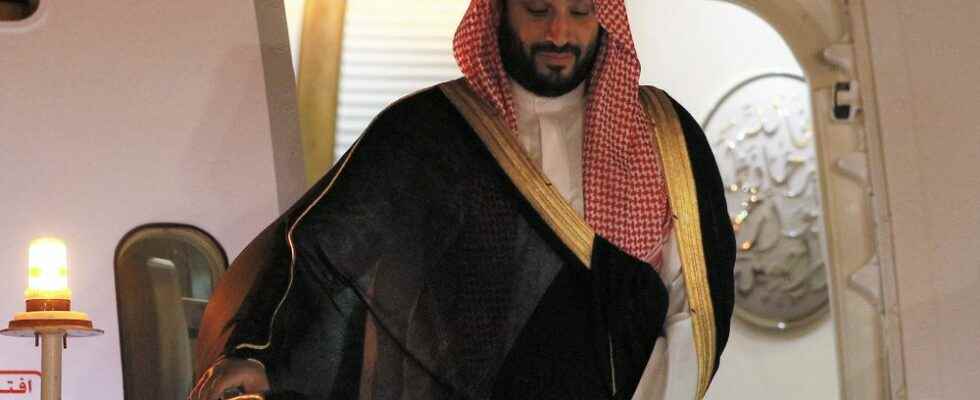An unpopular trip for an unpopular president. This Wednesday, July 13, Joe Biden is flying to Jerusalem and a four-day tour of the Middle East, which will take him to Israel, the Palestinian territories and Saudi Arabia. The tenant of the White House hopes to leave behind him inflation, catastrophic polls and his powerlessness in the face of mass shootings or the ultra-conservative wave. Not sure, however, that the air is more breathable on the other side of the world.
A sign of the unease surrounding this trip, Biden took the trouble to justify his trip by writing a long article for the washington post. Entitled “Why am I going to Saudi Arabia”, the column defends its policy in the Middle East, from the resumption of nuclear negotiations with Iran to the cessation of American military operations in the region. But his local allies reserve a mixed reception for the American president. “Biden is trying to get closer to the Middle East after leaving us, blows a Gulf source, disappointed by the first months of the Democratic leader. American commitments in the region seem to us to be wavering, he will have to provide strong guarantees. Each of the stages of his tour promises at least one political and diplomatic trap.
In Israel, a visit in the midst of electoral chaos
His first stop, in Israel, takes place in the midst of political upheaval. The coalition in power for a year has just collapsed and a new prime minister takes charge of day-to-day business until a tense election in three months. At least Biden will be greeted here by a friendly face, that of Yair Lapid, a center-left secularist who took the reins of government on June 30.
But the shadows of the electoral campaign, and especially that of former Prime Minister Binyamin Netanyahu, complicate the equation for the American president. “This visit has an eminently political dimension, Lapid being part of the axis of democrats, progressives, liberals, humanists embodied by Biden at the international level, while his opponent Netanyahu plays on the fiber of identity, underlines David Khalfa, associate researcher at the Observatory of North Africa and the Middle East of the Jean-Jaurès Foundation. Biden was delighted that the Netanyahu page was turned in Israel. The latter also mentioned the visit of “President Trump” on Monday, before catching up to talk about “President Biden”…
The 79-year-old head of state will then go to Ramallah to meet the leaders of the Palestinian Authority. It will be difficult for him to mask the lack, or even the total absence, of progress for the condition of the Palestinians since he came to power. Washington is particularly embarrassed by the death of American-Palestinian journalist Shireen Abu Akleh, shot dead during an Israeli operation in the West Bank last May. While the American investigation has just issued its conclusions on the tragedy, without naming anyone responsible, the victim’s family has asked to meet Biden. Here too, the symbol will be difficult to manage for the White House.
The hardest part will be yet to come for Biden. Thursday, he will fly aboard the first flight between Tel Aviv and Jeddah, Saudi Arabia, a strong symbol of the normalization underway in the Middle East. After this moment of rejoicing, the American president fears more than anything the handshake that will follow: the one with Crown Prince Mohammed bin Salman, known as MBS, accused of having ordered the assassination of journalist Jamal Khashoggi and whom Biden had promised to treat “like the pariah he should be”. But the political reality catches up with the president of the first world power, whose gesture is already criticized by his own democratic allies…
Embarrassing moment for the White House: Joe Biden will have to shake hands with Saudi Crown Prince Mohammed bin Salman in Jeddah.
afp.com/Khalil MAZRAAWI
READ ALSO >> “Everyone dreams of it”: between Israel and Saudi Arabia, a revolutionary rapprochement
In the campaign and during his first months as president, Joe Biden had emphasized human rights in his foreign policy, neglecting the Gulf autocrats. On several occasions, the latter have openly complained about the lack of American support in the face of drone attacks by pro-Iran militias. “The global crisis, both security and energy, is forcing Americans to return to the Gulf, points out a local source. But Joe Biden was really distant, his attitude worried us, especially vis-à-vis Iran. Tehran is an existential concern for the Gulf countries, we are only a few kilometers from this threat.”
Reinforce the axis against Tehran
By shaking hands with the “pariah” MBS, Joe Biden recognizes his inescapable character, in the midst of soaring energy prices: he hopes that by sacrificing his humanist promises, the petromonarchies will agree to produce more hydrocarbons and lower world prices – along with US pump prices.
Officially, however, energy will not be the main objective of this American trip. The White House insists on the need for a new defense architecture in the Middle East, in the face of the Iranian threat. While the hope of an agreement with Tehran on its nuclear program grows more tenuous every day, Joe Biden wants to reassure his closest allies in the region – Israel, the United Arab Emirates and Saudi Arabia – and push them to cooperate.
“There is no strategic reversal, but a reorientation of American policy in the Middle East, with Biden’s desire to reassure his traditional partners and to reinstall the United States in a role of protective power in the face of the Iran, says David Khalfa. This trip comes at a crucial time for the White House, which intends to contain Russia’s ambitions in the region, at a time of the Ukrainian crisis and when the Gulf countries have strengthened their relations with the Kremlin in recent years, precisely to compensate for the perceptible withdrawal of the United States.”
After these four days of high-risk touring, Joe Biden will probably not be so unhappy to find his American problems again.
